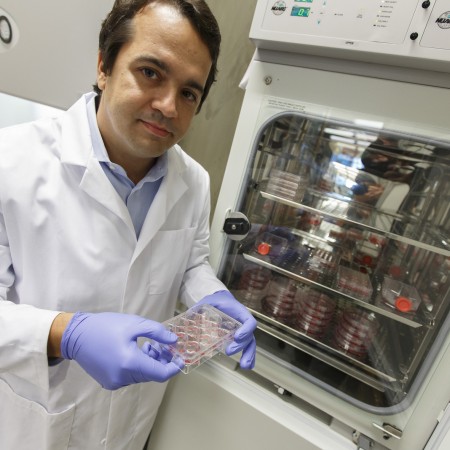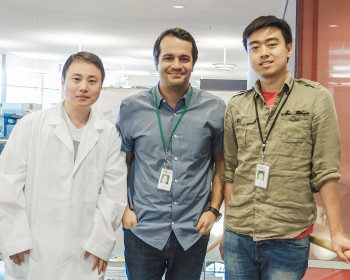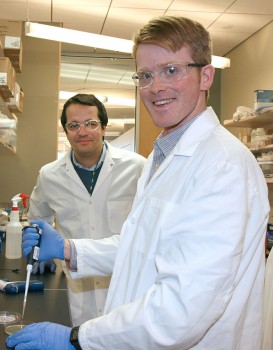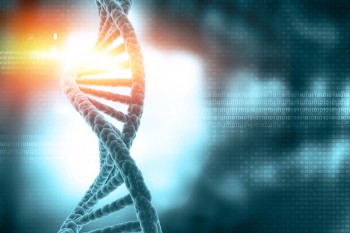PostDoc - Systems Biology
Harvard University - 2009

Professional Preparation
PhD - Electrical Engineering
Lehigh University - 2006
Lehigh University - 2006
M.S. - Electrical and Computer Engineering
Lehigh University - 2002
Lehigh University - 2002
BS - Electrical and Computer Engineering
Aristotle University of Thessaloniki - 2000
Aristotle University of Thessaloniki - 2000
Publications
Transcripts for combined synthetic microRNA and gene delivery.
Kashyap, N., B. Pham, Z. Xie, L. G. Bleris
Molecular BioSystems, 9, 2013. 2013 - Publication
Genetic architectures for copy-number and noise control in human cells.
L. G. Bleris.
2012 BMES Annual Meeting, Atlanta, GA, Oct, 2012. 2013 - Publication
Synthetic mammalian transgene negative autoregulation.
Shimoga, V.*, White, J.*, Li, Y., E. Sontag, L. G. Bleris
Nature/EMBO Molecular Systems Biology, 9:670, 2013. 2013 - Publication
Reverse engineering validation using a benchmark synthetic gene circuit in human cells.
Kang, T., J. White, Z. Xie, Y. Benenson, E. Sontag, L. G. Bleris
ACS Synthetic Biology, 2 (5), 2013. 2013 - Publication
MicroRNA circuits for transcriptional logic. Leisner, M., L. G. Bleris, J. Lohmueller, Z. Xie, Y. Benenson. Methods in Molecular Biology, Volume 813, Part 2, 2012 2012 - Publication
Transcription activator-like effector hybrids for conditional control and rewiring of chromosomal transgene expression.
Li, Y., R. Moore, M. Guinn, L. G. Bleris
Scientific Reports 2:897, doi:10.1038/srep00897, 2012. 2012 - Publication
Mechanism-Based Pharmacokinetic Model to Predict Endogenous Autoantibody Clearance Levels.
Pannala, V., D. Challa, S. Ward and L. G. Bleris.
AIChE 2012 Annual Meeting, Pittsburg, PA, Nov, 2012. 2012 - Publication
Characterization of Coherent Feedforward Motifs in Mammalian Cells Using Synthetic Gene Circuits.
Moore, R., Li, Y., and L. G. Bleris.
AIChE 2012 Annual Meeting, Pittsburg, PA, Nov, 2012. 2012 - Publication
Appointments
Independent Expert/Evaluator
European Commission [2008–2018]
European Commission [2008–2018]
Projects
"Engineering Robust to Fluctuations General-Purpose Gene Networks", UT Southwestern Medical Center
2018–2018Engineering Synthetic Gene Networks in Cells, Tulane University
2018–2018Information Processing in Cells Using Synthetic Molecular Devices, George Mason University
2018–2018Engineering in Cells: Synthetic Molecular Devices, RWTH University, Germany
2018–2018Gene Networks and Devices, Aristotle University of Thessaloniki
2018–2018News Articles
2 UT Dallas Researchers Receive Awards from NSF CAREER Program
Two UT Dallas faculty members recently earned National Science Foundation Faculty Early Career Development (CAREER) Awards.Dr. Anton Malko, assistant professor of physics, and Dr. Leonidas Bleris, assistant professor of bioengineering, will each receive $400,000 in funding for five years of research into areas of renewable energy and genome editing technologies, respectively.
Malko’s award will advance his research in the development of new hybrid materials that could offer a versatile platform for optoelectronic applications. In particular, they show promise for the next generation of photovoltaic solar cells that will harness sunlight for use as an ecofriendly and renewable energy-generating technology.
Jonsson School Researchers Gain New Insight on Biological Networks
 Bioengineers from the Erik Jonsson School of Engineering and Computer Science at UT Dallas have shed light on the mysteries of biological pathways.
Bioengineers from the Erik Jonsson School of Engineering and Computer Science at UT Dallas have shed light on the mysteries of biological pathways.The findings, which were published in the journal Proceedings of the National Academy of Sciences (PNAS), could affect a wide range of applications relevant to public health and therapeutics.
In the article, “Discriminating Direct and Indirect Connectivities in Biological Networks,” the team of researchers shows that the integration of engineering, mathematics and synthetic biology can lead to new insights on the properties of biological networks.
Team Creates New Approach to Gene Therapy
 Bioengineers at The University of Texas at Dallas have created a novel gene-delivery system that shuttles a gene into a cell, but only for a temporary stay, providing a potential new gene-therapy strategy for treating disease.
Bioengineers at The University of Texas at Dallas have created a novel gene-delivery system that shuttles a gene into a cell, but only for a temporary stay, providing a potential new gene-therapy strategy for treating disease.The approach offers distinct advantages over other types of gene therapies under investigation, said Richard Taplin Moore MS’11, a doctoral student in bioengineering in the Erik Jonsson School of Engineering and Computer Science. He is lead author of a study describing the new technique in the Jan. 30 issue of the journal Nucleic Acids Research
Why Do Identical Cells Act Differently? Team Unravels Sources of Cellular ‘Noise’
 University of Texas at Dallas researchers have taken an important step toward explaining why genetically identical cells can produce varying amounts of the same protein associated with the same gene.
University of Texas at Dallas researchers have taken an important step toward explaining why genetically identical cells can produce varying amounts of the same protein associated with the same gene.In a study published Aug. 18 and appearing in the Sept. 18 print edition of the journal Nucleic Acids Research, researchers demonstrated that most of the fluctuations in gene expression between identical cells occur in the first step of protein production, called transcription.
Understanding why and how such fluctuations, or cellular noise, occur is a fundamental bioengineering problem, said Dr. Leonidas Bleris, associate professor of bioengineering in the Erik Jonsson School of Engineering and Computer Science and Fellow, Cecil H. and Ida Green Professor in Systems Biology Science.